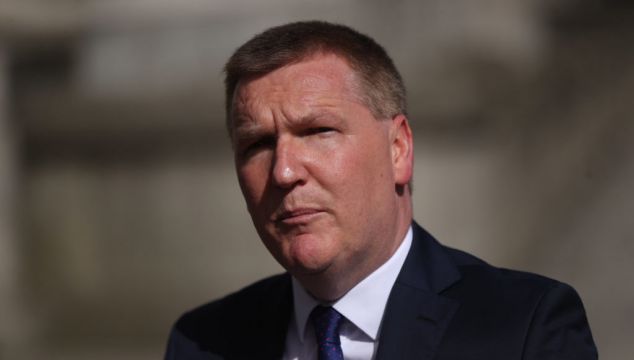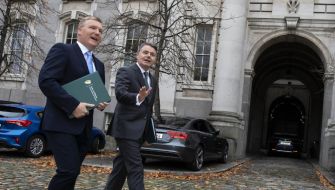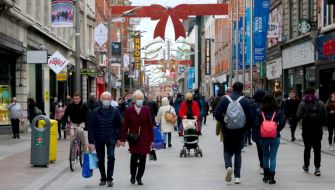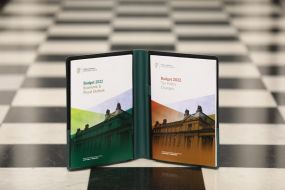The Government has pledged that its multibillion-euro Budget will help secure a social and economic recovery as Ireland emerges from the pandemic.
Minister for Public Expenditure Michael McGrath said the Government has used its lessons from Covid to build a country with a “better quality of life”.
Unveiling the Budget for 2022, a package that amounts to €4.7 billion earlier today, Minister for Finance Paschal Donohoe said the Government is “conscious” of cost-of-living pressures on the public and businesses.
Addressing the Dáil, he noted that the last time he announced the Budget in the chamber was two years ago before the Covid-19 pandemic.
💼#Budget2022 Thread💼
Today's budget will:
🏥Restore our public services
📊Repair our public finances
👷Continue the recovery of our jobs and economy
Follow this thread for updates across the day🧵⛅️ pic.twitter.com/HRKzrHm9zVAdvertisement— MerrionStreet.ie (@merrionstreet) October 12, 2021
“None of us could have foreseen that the worst global pandemic in a century awaited,” he said.
“We knew well about the risks associated with Brexit and had prepared for it, but we could not have predicted the devastation Covid-19 would leave in its wake.
“Both events have demonstrated our need to prepare for the worst while striving for the best.”
Among the announcements was a confirmation that welfare payments and the weekly state pension will increase by €5.
Minister @Paschald has announced the extension of the Help-to-Buy scheme in its current enhanced form for 2022 #Budget2022 #HousingforAll pic.twitter.com/IJlaOd9qhf
— Department of Finance (@IRLDeptFinance) October 12, 2021
The living alone allowance will increase by €3, while the fuel allowance will rise by €5.
“I am pleased to announce a 100 per cent Christmas bonus for 2021 which will assist many families with outgoings over the festive period,” Mr McGrath added.
It was also confirmed that young people, aged between 19-23, will be able to use public transport with a 50 per cent discount on fares.
“In order to promote modal shift in the transport sector, I am providing €25 million for the introduction of a Youth Travel Card,” Mr McGrath said.
He also said more capacity is needed in the childcare sector and more flexibility for working parents.
Mr McGrath said Budget 2022 marks a “turning point” in the state’s approach to the early years and childcare sector.
“A new funding stream for up to 4,700 early years and childcare providers will be put in place from September 2022 onwards, at an estimated cost of €69 million next year, to support improvements in the quality of childcare provision.
“To address affordability for parents, we will extend the National Childcare Scheme universal subsidy to children under 15 from September 2022, benefiting up to 40,000 children at a cost of €5 million.
“We will also remove the practice of deducting hours spent in pre-school or school from the entitlement to NCS subsidised hours. This will benefit an estimated 5,000 children, particularly from low-income families.”
Mr Donohoe confirmed that the Employment Wage Subsidy Scheme (EWSS) will remain in place until April 30th, and it will taper off over the coming months.
He also said the reduced VAT rate of 9 per cent for the hospitality sector will remain in place until August 2022.
Some of the measures announced will also benefit remote workers.
Mr Donohoe said: “I am announcing an income tax deduction amounting to 30 per cent of the cost of vouched expenses for heat, electricity and broadband in respect of those incurred while working from home.”
As expected, he also announced the standard rate band for income tax will increase by €1,500.
He also said personal tax credit, employee tax credit and earned income credit will increase by €50.
Minister @Paschald has announced an income tax deduction amounting to 30% of the cost of vouched expenses for heat, electricity and broadband in respect of those incurred while working from home #Budget2022 pic.twitter.com/KSjakSOBJT
— Department of Finance (@IRLDeptFinance) October 12, 2021
Mr Donohoe said the national minimum wage will increase by 30 cent to €10.50 an hour.
He also told the Dail that a 3 per cent zoned land tax will be introduced, set to apply to land which is zoned as suitable for housing but remains undeveloped.
“The tax will be based on the market value of the land and I have determined that the rate at the outset should be 3 per cent,” he said.
The tax has a two-year lead-in time for land zoned before January 2022 and three years for after that date.
“To support carers and people with disabilities, from January next year I will extend the period during which domiciliary care allowance can be paid for children in hospital from three to six months,” Mr McGrath added.
“The rate of wage subsidy scheme for people with disabilities will rise by €1 per hour.
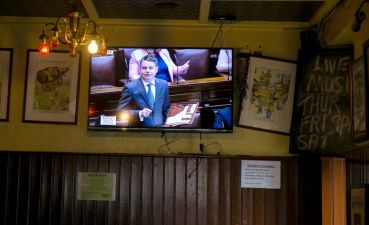
“I am increasing the income disregard for carer’s allowance from €332.50 to €350 for a single person and from €665 to €750 for a couple.”
He also described climate change as “one of the most important issues of our time”, telling the Dáil: “The world is burning.”
Alongside the annual increase in the carbon tax by €7.50 per tonne, Mr Donohoe said that to incentivise uptake of electric vehicles the Government will extend the €5,000 relief for battery electric vehicles until the end of 2023.
